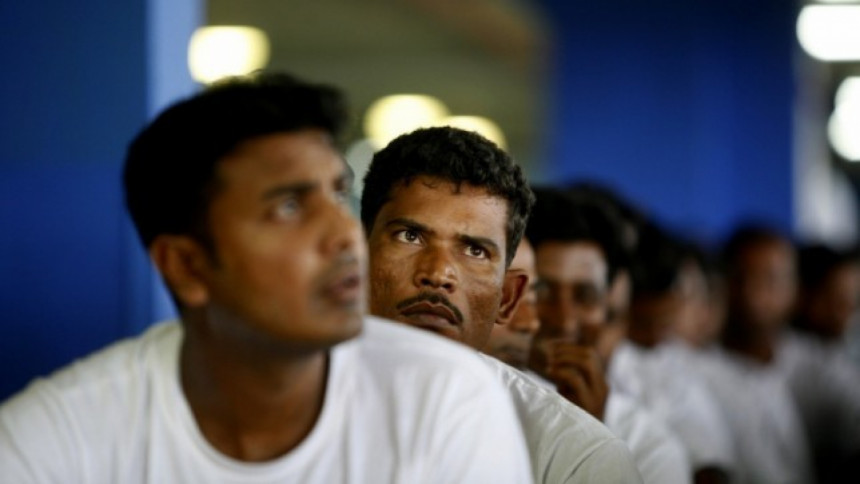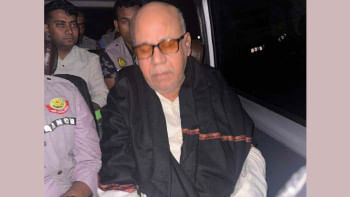Stories of wage theft and injustice

Irregular payment led me to work elsewhere illegally...As a result, I was nabbed by police and subsequently deported home after serving 37 days in jail.
During a public hearing, the returnees, some of whom were employed for over a decade, said employers did not pay them due wages for months or paid less than what was promised.
Moreover, they said they were not recruited for the jobs that were promised to them or they had to work for ungodly hours, violating the agreement they had with the employers.
Refugee and Migratory Movements Research Unit (RMMRU), with support from Migrant Forum in Asia (MFA) and Daily Bonik Barta, organised the public hearing in the capital's Jatiya Press Club.
Participants said the Bangladesh government needs to relay the workers' claim at regional and global forums and create a position for bargaining to recover the dues.
An MFA report published in February this year -- documenting cases of wage theft against migrants in five countries, including Bangladesh -- calculated that the total amount of wages "stolen" from a little over 2,000 workers amounted to $19.2 million.
Abu Bakar Siddique, a returnee migrant worker from Saudi Arabia, said he was hired in March 2020, at a monthly wage of 800 riyals. However, the employer did not give him any work or payment for the first three months amid the pandemic.
(The employer) would hurl abusive words if I asked for the due payment.
Later, he started a job at a construction site as a cleaner. However, the payment was irregular. Besides, the employer did not issue an iqama (work permit) for him.
"Irregular payment led me to work elsewhere illegally...As a result, I was nabbed by police and subsequently deported home after serving 37 days in jail," he added.
Ranu Begum, another Saudi returnee, said she worked there for about four years as a domestic worker but the employer did not pay her wage for at least 15 months. The employer paid her 600 riyals a month, contrary to the promised amount of 1,000 riyals.
"[The employer] would hurl abusive words if I asked for the due payment," she said, adding, she came home amid the pandemic on vacation and never went back.
Hazrat Ali, who worked in Lebanon for 11 years since 2009, said each year, his employer deducted money from his wage for the renewal of various papers, although the employer was supposed to bear this expense.
Md Mizan, who worked in the United Arab Emirates for more than a decade, said he left behind his service benefits before coming home amid the pandemic.
Reading out a paper, RMMRU Executive Director Prof CR Abrar said "systemic wage theft" occurs when there is a violation of conditions that are agreed upon during a worker's recruitment.
Violations can be in the form of workers not getting paid the promised wage or for overtime, and situations in which workers are forced to work overtime, he said.
He mentioned that there has been a global call for an "international trial process" to address wage-theft issues urgently. Abrar stressed on documenting the wage-theft claims of Bangladeshi migrant workers.
Hossain Zillur Rahman, executive chairman of Power and Participation Research Centre, said although there has been much discussion on migrant workers' contribution to the country's economy, the discussion regarding their needs is comparatively neglected.
He said migrant workers pay additional money during their migration, but there is no sufficient explanation for this.
Many migrant workers have to work for extended hours, which is "wage slavery". Meanwhile, there is also a lack of remedial support for them.
He also called for forming a global "Covid justice fund for migrants".
Bangladesh Press Council Chairman Justice Nizamul Huq Nasim said whether migrant workers are getting their wages and benefits as per their job contracts should be looked into.
He said the Bangladesh government should take responsibility for recovering the due wages.
Supreme Court lawyer Barrister Jyotirmoy Barua said migrant workers are called "remittance warriors" but whether they are getting the due recognition should be addressed.


 For all latest news, follow The Daily Star's Google News channel.
For all latest news, follow The Daily Star's Google News channel. 



Comments